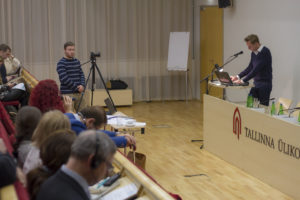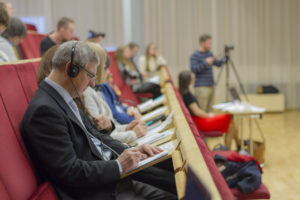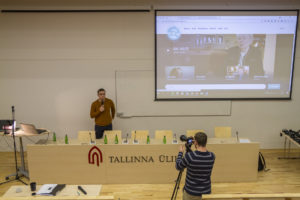
The Estonian Institute of Historical Memory’s oral history initiative, Kogu Me Lugu, has taken a big step forward in its fifth year of activity. After undergoing major development, the KML project website has been relaunched with a wealth of freely available video interviews, greatly enhanced functionality, as well as new study and teaching materials. The new portal was presented to Estonian educators and international guests at a daylong event at Tallinn University on December 7th, 2017. The event was part of the 2-year strategic cooperation project “Developing Strategic Cooperation in History and Human Rights Education and Youth Work in Estonia“, funded by the Erasmus+ programme of the European Commission.
Kogu Me Lugu (which in Estonian means “Collect Our Story”, “We’re Collecting the Story”, also “Our Entire Story”) was created to record, preserve and share family stories of Estonians from around the world. KML focuses on the memories of people who were repressed by the Soviet or Nazi regimes and those who escaped from or arrived in Estonia during these occupations. The stories collected are used in research as well a s for developing educational materials and raising public awareness in Estonia and abroad. Kogu Me Lugu was launched in 2013 and so far over a hundred and fifty interviews have taken place in Estonia and in the Estonian diaspora around the world.
s for developing educational materials and raising public awareness in Estonia and abroad. Kogu Me Lugu was launched in 2013 and so far over a hundred and fifty interviews have taken place in Estonia and in the Estonian diaspora around the world.
The new portal (www.kogumelugu.ee) offers several useful functionalities to the visitor. The interview videos come in two parts – a full, uncut recording of the whole interview and smaller clips that focus on “highlights” such as personal stories or important topics. The videos can be browsed freely or searched for through various filters. In order to quickly find what one is most interested in, for example as an educator looking for teaching materials, there are subpages with tags for topics, regions, and people mentioned in the videos. Next to this, there is also a world map with markers for all localities that come up in the interviews. This is not only a useful tool for the user who wants to single out memories about certain geographical areas, but also shows the global scope of the stories collected at a single glance. The online portal comes in Estonian, Russian, and English, while the videos are subtitled in those two out of the three languages that were not used in the respective interview. As the Kogu Me Lugu team is continuing to record memories, the database and video archive will be growing further and provide useful materials to educators, researchers, and the wider public.
On occasion of the portal’s launch, on December 7th the Estonian Institute of Historical Memory held a conference and training event for educators at Tallinn University. Next to a presentation of the portal and its various functions by the Kogu Me Lugu team (Sandra Vokk, Elisa Avik, and Elmar Gams), there were two training sessions on how to make best use of the materials in the classroom – one focused on history (held by Jüri Käosaar) and the other on human rights (held by Mariann Rikka).
 In the development of Kogu Me Lugu there has indeed been a focus on the usability of the materials for educators. This includes lesson plans with clear links of proposed topics and activities to the Estonian curriculum. Whether or not these suggestions are followed, one of the videos’ most important function in the classroom can be to expand the credibility of given information since it is not transmitted as usual just through the teacher, but told to the pupils by another voice. There is variation, while the teacher can assume the role of a moderator. Especially the interviews in the shorter form of video clips can be used in class, as pupils can focus more easily on them. The clips can be used as summaries of important topics that are more vivid than usual materials. Overall, the oral history materials can be related to in different ways, benefiting teaching about multiperspectivity. The stories reflect the variety of viewpoints in a society with different or even divided memories, since such different memories or interpretations were recorded side by side and can be contrasted and analysed together.
In the development of Kogu Me Lugu there has indeed been a focus on the usability of the materials for educators. This includes lesson plans with clear links of proposed topics and activities to the Estonian curriculum. Whether or not these suggestions are followed, one of the videos’ most important function in the classroom can be to expand the credibility of given information since it is not transmitted as usual just through the teacher, but told to the pupils by another voice. There is variation, while the teacher can assume the role of a moderator. Especially the interviews in the shorter form of video clips can be used in class, as pupils can focus more easily on them. The clips can be used as summaries of important topics that are more vivid than usual materials. Overall, the oral history materials can be related to in different ways, benefiting teaching about multiperspectivity. The stories reflect the variety of viewpoints in a society with different or even divided memories, since such different memories or interpretations were recorded side by side and can be contrasted and analysed together.
Before and after the training sessions, several special guests contributed their insights on history education, oral history, and the wider implications of memory initiatives such as Kogu Me Lugu to the conference. Prof. Martin Lücke (Free University of Berlin, Germany) started off with a keynote speech on the commonalities and challenges of human rights and history education, a topic which was further developed in a subsequent panel discussion that focused on present developments. Against the background of political and social challenges around Europe, the panelists agreed that oral history materials such as the Kogu Me Lugu archive can have a powerful role in advancing critical, multiperspective education on history, citizenship and human rights. The panelists were Prof. Lücke, Prof. Mustafa Öztürk (Erciyes University, Turkey) and Danute Grīnfelde (Education Development Centre, Latvia), joined by Mariann Rikka (Tallinn) in the role of moderator.
The event was organised by the Estonian Institute of Historical Memory in cooperation with Georg Eckert Institute for International Textbook Research, the Education Development Centre, and EUROCLIO – European Association of History Eduators, and benefited from funding by the Estonian Ministry of Education and Research, the Ministry of Justice, as well as the Erasmus+ Programme of the European Commission.
Written by Sven Mörsdorf, Deputy Project Manager at the Estonian Institute of Historical Memory






